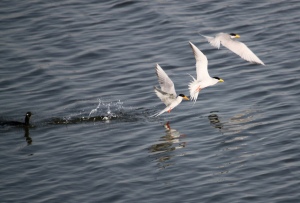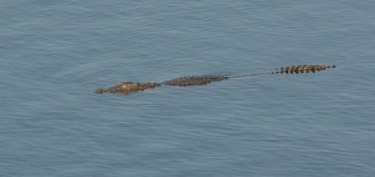The receding water in the Kamleshwar dam(Sasan Gir, Gujarat,
India) brought some good news for visitors and the officials at Gir
National Park. The low levels of water are inviting large flocks of
winged visitors. These migratory birds are returning to the dams in the
national park after a decade, said the officials.

Sources
in Gir said, “ This year because of the drought in the district, there
is hardly two or three feet of water at the edges of the Kamleshwar Dam
reservoir, and about four to five feet of water in the centre. This is
attracting large number of birds from nearby water bodies. Pelicans,
lesser flamingoes and cranes along with other migratory birds have
started flocking to the dam site.”
Visitors to the forest along the Kamleshwar dam route will get to see
these winged visitors and large number of crocodiles which are now
coming out of the water as the water is very low”.
Sandeep Kumar, the deputy conservator of forests, Gir, says for the
past two days, there have been good sightings of birds at the Kamleshwar
dam. These birds sighting are for the first time in a decade. “I have
been told by the staff that these birds have come to the Kamleshwar dam
after a long time. There have been sightings of pelicans, lesser
flamingoes among other. Demoiselle cranes are not usually seen in Gir,
but this time because of the less water, availability of food had
attracted the birds. This may be good news but what is worrying is that
the receding water will force officials to resort to alternate methods
of providing drinking water for the lions”.

Crocodile at Kamleshwar Dam, Sasan Gir, Gujarat, India
Samshad Alam, a researcher working in Gir for the past six years
says, “I had not seen these birds here thus far, so it came as a
surprise when saw them in large numbers. The dams have now caused of the
shallow waters. These waders, pelicans, and flamingoes need just nearly
two feet of water which, at present, is suitable for these birds.
Courtesy: – Times of India.

 Sources
in Gir said, “ This year because of the drought in the district, there
is hardly two or three feet of water at the edges of the Kamleshwar Dam
reservoir, and about four to five feet of water in the centre. This is
attracting large number of birds from nearby water bodies. Pelicans,
lesser flamingoes and cranes along with other migratory birds have
started flocking to the dam site.”
Sources
in Gir said, “ This year because of the drought in the district, there
is hardly two or three feet of water at the edges of the Kamleshwar Dam
reservoir, and about four to five feet of water in the centre. This is
attracting large number of birds from nearby water bodies. Pelicans,
lesser flamingoes and cranes along with other migratory birds have
started flocking to the dam site.”